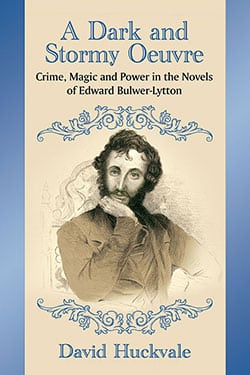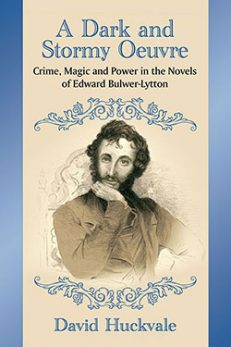A Dark and Stormy Oeuvre
Crime, Magic and Power in the Novels of Edward Bulwer-Lytton
Original price was: $39.95.$19.99Current price is: $19.99.
In stock
About the Book
Edward Bulwer-Lytton—who coined the terms “the great unwashed” and “the pen is mightier than the sword”—is best remembered for persuading Dickens to change the ending of Great Expectations; but Lord Lytton was a prolific and influential novelist in his own right, inspiring Edgar Allan Poe, H. Rider Haggard and Madame Blavatsky, among others. His radicalism was applauded by William Godwin, the father of both Mary Shelley and the anarchist movement, and his ideas about power foreshadowed those of Friedrich Nietzsche.
Fascinated by crime, Bulwer-Lytton was an outspoken critic of his society, both in his novels and throughout his political career. Equally fascinated by paranormal phenomena, he wrote two of the most important occult fantasies in English literature and set the agenda of the Society for Psychical Research.
His historical romance The Last Days of Pompeii has inspired several movies and a star-studded television series, while his stately home at Knebworth has provided brooding Gothic backdrops for many other films. This book covers Bulwer-Lytton’s novels in detail, exploring their influence on writers and film makers and, via Richard Wagner’s operatic adaptation of Rienzi, the catastrophe of Adolf Hitler.
About the Author(s)
Bibliographic Details
David Huckvale
Format: softcover (6 x 9)
Pages: 264
Bibliographic Info: 27 photos, notes, bibliography, index
Copyright Date: 2016
pISBN: 978-0-7864-9948-9
eISBN: 978-1-4766-2279-8
Imprint: McFarland
Table of Contents
Author’s Note vii
Introduction 1
One—Edward Bulwer-Lytton (1803–1873) 13
Two—Pelham; or, The Adventures of a Gentleman (1828) 19
Three—The Disowned (1828) 26
Four—Devereux (1829) 35
Five—Paul Clifford (1830) 45
Six—Eugene Aram: A Tale (1832) 59
Seven—Godolphin (1833) 70
Eight—The Last Days of Pompeii (1834) and The Pilgrims of the Rhine (1834) 80
Nine—Rienzi, the Last of the Roman Tribunes (1835) 98
Ten—Ernest Maltravers (1836) and Alice (1838) 114
First Interlude—Leila; or, The Siege of Granada (1838), Zicci: A Tale (1838) and Early Victorian Occultism 124
Eleven—Night and Morning (1841) 131
Twelve—Zanoni (1842) 138
Thirteen—The Last of the Barons (1843) 152
Fourteen—Lucretia; or, The Children of the Night (1846) 160
Fifteen—Harold—The Last of the Saxon Kings (1848) 170
Second Interlude—Bulwer-Lytton’s Realist Period: The Caxtons: A Family Picture (1849), My Novel; or, Varieties in English Life (1853), What Will He Do with It? (1858), and “The Haunted and the Haunters; or, The House and the Brain” (1859) 180
Sixteen—A Strange Story (1862) 193
Seventeen—The Coming Race (1871) 211
Epilogue: Kenelm Chillingly—His Adventures and Opinions (1873) and Knebworth House 220
Chapter Notes 229
Bibliography 245
Index 249
Book Reviews & Awards
- “This is a very readable and enjoyable exploration of a unique literary figure’s life and work”—Mystery Scene





